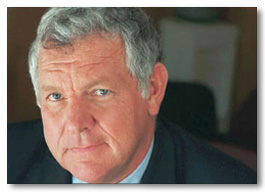Outcome-Based Education
- WILLIAM J. BENNETT
Some of the confusion surrounding outcome-based education is based on semantics.
 |
There are serious, legitimate concerns surrounding outcome-based education (OBE). In principle, it sounds good. In practice, however, OBE can be used to undermine parental authority and traditional moral and religious beliefs. This explains why much of the criticism of OBE has come largely from parents' rights groups.
A key to understanding outcome-based education depends on making the distinction between cognitive outcomes (i.e., the development of intellectual abilities and skills) and behavioral and social outcomes (i.e., the shaping of social attitudes, values, and interpersonal relationships).
A case can be made on behalf of outcome-based education if it is confined to cognitive outcomes; that is, if we objectively measure students' knowledge in the basicsmath, science, history, and English. Some people still believe that OBE can be used to advance such ends (a good example of OBE, properly utilized, is the current high school Advanced Placement exam, in which students do not get credit for their course unless they demonstrate proficiency in a rigorous nationwide test). This explains why conservative education reformers like Chester Finn, Jr. have spoken well of cognitively-based outcomes.
The real concern is when those in the education establishment use OBE to (1) eliminate objective measurable criteria (like standardized tests); (2) do away with the traditional subject-based curriculum in favor of an emphasis on things like general skills, attitudes and behaviors; and (3) advance their own radical social agenda. Increasingly, OBE is applied to the realm of behavior and social attitudesbecoming, in effect, a Trojan Horse for social engineering, an elementary and secondary school version of the kind of politically correct thinking that has infected our colleges and universities.
Outcome-based education raises a number of questions: what if parents do not want their children to view all lifestyles as equal? What if a young person has developed strong personal convictions based on traditional moral standards? Will students who do not give appropriate responses to desired outcomes still be allowed to graduate? It is also worth noting that little in the way of public input is sought when it comes to OBE, and it offers no method of accountability.
There are some other problems associated with OBE, including:
- The dumbing down of classes. Many of the curricula being developed call for teachers to wait for all students to understand all aspects of a subject before moving on. Many parents fear that this will penalize more advanced students.
- Traditional education terms are being reinterpreted. In some programs, cognitive now refers to a belief system, and critical thinking refers to a willingness to question everything, including one's deepest convictions, beliefs and relationships.
Some of the confusion surrounding outcome-based education is based on semantics. The conservative education reform movement of the 1980s wanted to focus on outcomes (i.e., knowledge gained) instead of inputs (i.e., dollars spent). The aim was to ensure greater accountability. What the education establishment has done is to appropriate the term but change the intent.
In short, the outcomes increasingly being measured are not based on objective and measurable criteria like standardized tests; the state-desired outcome is increasingly based on vague, subjective social aims. Consider some of the vocabulary that surrounds OBE: words like openness to change, appreciation of the global community, tolerance, and higher-order thinking skills.
There is a big push in the country on behalf of outcome-based education. But unless some means is found to ensure that it serves the traditional aims of sound intellectual and moral education, it should be resisted.
 This is Meaghen Gonzalez, Editor of CERC. I hope you appreciated this piece. We curate these articles especially for believers like you.
This is Meaghen Gonzalez, Editor of CERC. I hope you appreciated this piece. We curate these articles especially for believers like you.
Please show your appreciation by making a $3 donation. CERC is entirely reader supported.

Acknowledgement
William J. Bennett Outcome-Based Education. Taken from a talk given on May 27, 1993.
Reprinted by permission of William J. Bennett and Empower America.ed0034.html
The Author
A native of Brooklyn, New York, Bill Bennett studied philosophy at Williams College (B.A.) and the University of Texas (Ph.D.) and earned a law degree from Harvard. He is the Washington Fellow of the Claremont Institute, & a CNN Contributor. Dr. Bennett is the host of a nationally broadcast radio show from 6:00-9:00 a.m. (EST): Bill Bennett's Morning in America.
During the 1980s, Dr. Bennett served as President Reagan's chairman of the National Endowment for the Humanities (1981-1985) and Secretary of Education (1985-1988), and President Bush's "drug czar" (1989-1990).
Dr. Bennett has recently completed a two-volume history of the United States, entitled: America: The Last Best Hope, Volumes 1 & 2 — both New York Times Best-sellers. He has written and edited a total of 16 books, including What Works: William J. Bennett's Research About Teaching and Learning, The Educated Child: A Parents Guide From Preschool Through Eighth Grade, The Book of Virtues, The Children's Book of Virtues, The Children's Book of Faith, The Children's Book of Home and Family, The Broken Hearth: Reversing the Moral Collapse of the American Family, and The Moral Compass: Stories for a Life's Journey. He, his wife Elayne, and their two sons live in Maryland.




